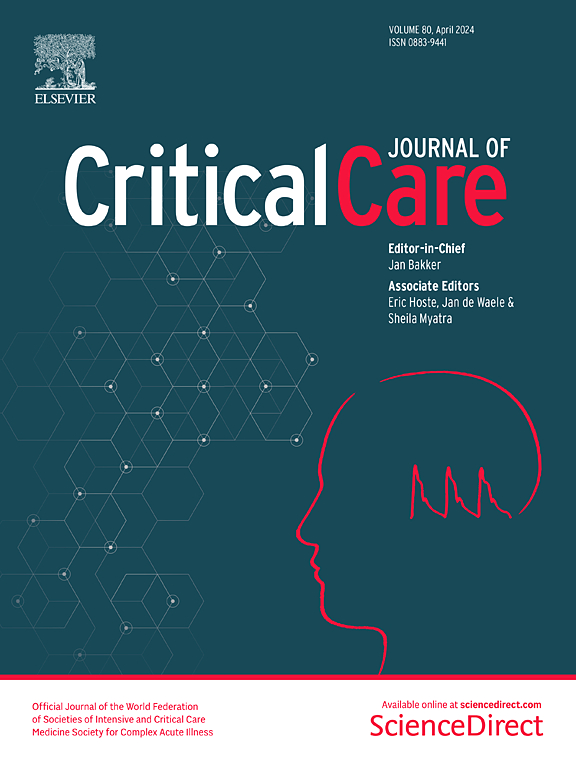Use of a molecular syndromic panel for the etiological diagnosis of ventilator-associated bacterial pneumonia: impact on clinical outcomes and antibiotic use from a multicenter, prospective study
IF 9.3
1区 医学
Q1 CRITICAL CARE MEDICINE
引用次数: 0
Abstract
Ventilator-associated bacterial pneumonia (VABP) is a common infection in critically ill patients in intensive care units (ICU), with attributable mortality of up to 13%, and its etiological diagnosis remains challenging. We conducted a multicenter, prospective, observational study within the MULTI-SITA platform to assess the impact on relevant clinical and antimicrobial stewardship outcomes of the use of a molecular syndromic panel (BIOFIRE® FILMARRAY® Pneumonia plus), in addition to a standard approach based on culture. The primary outcome measure was 30-day mortality from VABP onset. Overall, 237 patients with VABP were included in the study. In multivariable analysis, SOFA score (hazard ratio [HR] 1.13, 95% confidence interval [CI] 1.04–1.22, p = 0.003), previous isolation of carbapenem-resistant Pseudomonas aeruginosa (HR 3.02, 95% CI 1.25–7.32, p = 0.015), and solid neoplasm (HR 2.15, 95% CI 1.12–4.14, p = 0.022) were associated with increased mortality, while no association was registered for the molecular syndromic panel performed (HR 1.07, 95% CI 0.59–1.93, p = 0.825). In secondary analyses, use of the molecular syndromic panel resulted in more events of either de-escalation or initiation of appropriate antibiotic therapy at day 1 from VABP onset in comparison with a standard approach based on culture only (41.3% vs. 27.8%, p = 0.041). The use of a molecular syndromic panel in patients with VABP was able to impact antibiotic decisions, without an unfavorable effect on mortality. Further study is necessary to assess the long-term effects in terms of antimicrobial stewardship of molecular syndromic panels-based antibiotic treatment decisions.使用分子综合征小组进行呼吸机相关细菌性肺炎的病原学诊断:来自多中心前瞻性研究对临床结果和抗生素使用的影响
呼吸机相关细菌性肺炎(VABP)是重症监护病房(ICU)危重患者的一种常见感染,可导致高达13%的死亡率,其病因学诊断仍然具有挑战性。我们在MULTI-SITA平台上进行了一项多中心、前瞻性、观察性研究,以评估除了基于培养的标准方法外,使用分子综合征小组(BIOFIRE®FILMARRAY®Pneumonia plus)对相关临床和抗菌药物管理结果的影响。主要结局指标为VABP发病后30天死亡率。总共有237例VABP患者被纳入研究。在多变量分析中,SOFA评分(风险比[HR] 1.13, 95%可信区间[CI] 1.04-1.22, p = 0.003)、以前分离的耐碳青霉烯假单胞菌(风险比3.02,95% CI 1.25-7.32, p = 0.015)和实体肿瘤(风险比2.15,95% CI 1.12-4.14, p = 0.022)与死亡率增加相关,而分子综合征组未发现相关(风险比1.07,95% CI 0.59-1.93, p = 0.825)。在二次分析中,与仅基于培养的标准方法相比,使用分子综合征组在VABP发病第1天导致更多的事件降级或开始适当的抗生素治疗(41.3% vs. 27.8%, p = 0.041)。在VABP患者中使用分子综合征小组能够影响抗生素的决定,对死亡率没有不利影响。需要进一步的研究来评估基于分子综合征小组的抗生素治疗决策的抗菌药物管理方面的长期影响。
本文章由计算机程序翻译,如有差异,请以英文原文为准。
求助全文
约1分钟内获得全文
求助全文
来源期刊

Critical Care
医学-危重病医学
CiteScore
20.60
自引率
3.30%
发文量
348
审稿时长
1.5 months
期刊介绍:
Critical Care is an esteemed international medical journal that undergoes a rigorous peer-review process to maintain its high quality standards. Its primary objective is to enhance the healthcare services offered to critically ill patients. To achieve this, the journal focuses on gathering, exchanging, disseminating, and endorsing evidence-based information that is highly relevant to intensivists. By doing so, Critical Care seeks to provide a thorough and inclusive examination of the intensive care field.
 求助内容:
求助内容: 应助结果提醒方式:
应助结果提醒方式:


